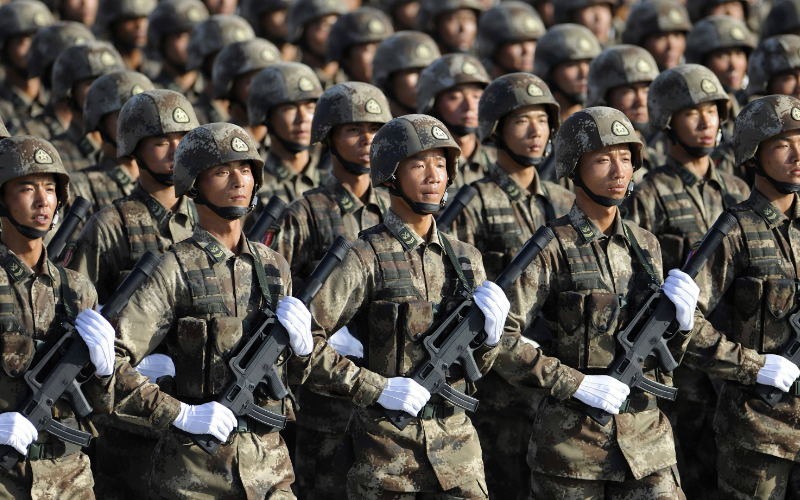Defense Minister Yoav Gallant said Wednesday that Israel was entering a “new phase” of its war with Iran-backed Hezbollah. The new phase, however, doesn’t mean the war against Hamas in Gaza is complete.
“We’re not finished with Gaza. We just buried four soldiers today who were killed yesterday in Gaza. We’re not done,” Caroline Glick, the senior contributing editor for the Jewish News Syndicate (JNS), said on Washington Watch Wednesday.
News analysts have expressed concerns about the war expanding, but that concept is a step behind, Glick told show host Tony Perkins.
“We’re in a multi-front war. There’s nothing we can do about it. We have to continue fighting in Gaza, and it’s very difficult because as a maneuver force, the Israel Defense Forces is quite small,” she said.
The multiple-front war is not new
As Glick explained, multiple fronts have existed almost from the beginning.
“Really, it’s been a regional war, it’s been a seven-front war that Iran has been waging against Israel through all of its proxies … in Lebanon, in Gaza, in Judea and Samaria, in Syria, in Iraq, in Yemen and from Iran itself. So, we’re talking about a regional war that’s been going on. The question just becomes how are the different fronts going to develop?” Glick observed.
Reports say thousands have been injured, but fewer than 40 – not all of them military – have died in Israel’s pager and walkie talkie attacks against Hezbollah. That’s a fraction of Hezbollah’s overall strength. Real numbers are hard to come by, but Sec. Gen. Hassan Nasrallah has claimed Hezbollah has 100,000 fighters.
Already this multi-front war is Israel’s longest since its founding in 1948.

Renewed focus on Hezbollah comes after “massive escalation in the missile attacks on Israel by Hezbollah over the past couple of weeks,” Glick explained. “We’ve been seeing over 100 missiles [per day] shot into Israel ….”
When Gallant’s commanders start moving the pieces on their chess board, options are limited. According to Glick, they have to consider the toll constant fighting places on their troops.
“It means you have to scale back your operations in Gaza in order to have the forces you need in order to carry out a conventional battle inside Lebanon …. It’s a lot of juggling of the forces and trying to prevent exhaustion of the forces and of our reservists. It’s a very difficult situation,” Glick said.
Securing the north for scattered citizens
The new phase will require adaptation and perseverance, Gallant told Air Force personnel at the Ramat David Airbase in northern Israel.
The country's defense minister has emphasized the goal of safely returning residents to homes in northern Israel who became refugees when Hezbollah started firing on northern Israel in the days after the murderous rampage by Hamas near Gaza in the southern part of the country.
If the new phase is successful, many residents will return to empty land and lots where homes have already been destroyed, Glick said.
“People have been refugees, they’ve been out of their homes since mid-October, and when they get back you’re going to have dozens and dozens of homes in their communities that just no longer exist.”
This week’s events against Hezbollah may also underscore the resolve of Israeli Prime Minister Benjamin Netanyahu, who has repeatedly said it would fight the war with or without help from its strongest traditional ally, the United States.
In an onstage interview before a gathering of the National Association of Black Journalists, Vice President and Democratic presidential candidate Kamala Harris said she “is entirely supportive of” the U.S. continued withholding of 2,000-pound bombs.
In that interview, she was pressed as to why the U.S. isn’t using more “leverage” against Israel.
Harris, says Glick, “has made very clear that when she says she supports Israel’s right to defend itself, what she means is she supports our ability to intercept missiles en route to Israel – and if we miss from time to time, well, tough luck."
In other words, Harris "does not support Israel defending itself by defeating its enemies,” Glick summarized.
The JNS editor contends that the bombs the U.S. isn’t providing would bring about an end to the war.
“The weapons systems that have been held up by the administration are offensive weapons systems that you need in order to finish the job, in order to win," she explained. "We’ve never fought such a prolonged war before, and that has a lot to do with the White House’s opposition to an Israeli victory which is shocking, given the stakes in this war and the nature of our enemy, Iran and its terror proxies. But that does seem to be the position of this administration.”
Nation of Israel turning to God again
Through it all, Glick said she sees Israel returning to its faith in God as the war nears its one-year anniversary in less than 20 days.
“People are realizing that what happened on Oct. 7 happened because we’re Jewish – and that if we want to withstand this challenge to our survival, then we do it as Jews,” she said.
More secular Jews and young men are showing outward expressions of their faith, she shared – and prayer and Torah study are more common among IDF forces.







